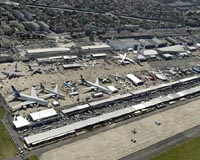| . |  |
. |
Tel Aviv, Israel (UPI) Jun 17, 2009 The day Osama bin Laden's suicide squads attacked the United States, Maj. Gen. Uzi Dayan, who in 2001 headed Israel's National Security Council, was conducting a "strategic dialogue" in New Delhi with his Indian counterpart, Brajesh Mishra. Dayan's presence in the Indian capital on Sept. 11, 2001, was, of course, pure happenstance. But the events of that fateful day cemented a strategic relationship that has never stopped growing and has strengthened Israel's burgeoning influence in southern and central Asia. Today, Israel has overtaken Russia as India's leading defense supplier. Both Israel and India, one Jewish, the other Hindu, are locked in deadly combat with Islamist extremists, and after the November 2008 attacks in Mumbai -- India's Sept. 11 -- that killed 165 people, including five Israelis, security cooperation between the two nations has skyrocketed -- literally. On April 20 India launched its RISAT-2 satellite, built by Israel Aerospace Industries, the state-owned flagship of Israel's defense industry. The craft is equipped with the same multi-spectral aperture radar as the TECSTAR 1 satellite developed for Israel's military. The launch gave India vital surveillance capabilities to guard against further attacks by Islamist raiders, whose seaborne assault it had not detected. But it also gave Israel an important breakthrough: an Indian satellite that will provide additional surveillance of Iran and its missile-launching zones with its sensors that can take photos with a maximum ground resolution of 1 meter day and night and through cloud cover. That kind of spy capability gives India a major edge over Pakistan, and indeed every other Asian state except China and Japan. Israel has been hampered in its efforts to keep tabs on Iran because, due to the Jewish state's geographical location, it is only able to launch its own intelligence-gathering satellites westward, against the Earth's rotation. That limits the range of orbits over Iran. Launching from the Satish Dhawan Space Center on the Gulf of Bengal in southeastern India means Israel can launch eastward, adding another dimension to its surveillance of the Islamic Republic. The 650-pound RISAT-2, delivery of which the Israelis accelerated after Mumbai, also cemented a burgeoning intelligence alliance that has been expanding over the last 40 years -- even though it was a clandestine relationship until India recognized Israel in 1992. In January India took delivery of the first of three Phalcon all-weather, early warning command and control systems manufactured by Israel Aerospace Industries and mounted on Russian-built Ilyushin Il-76 aircraft under a $1.1 billion deal. Delivery had been advanced by two months following the Mumbai attacks. The radar systems were built by Israel's Elta Industries. Negotiations are under way for another three Phalcons, and if that deal goes through it would be the largest defense contract ever sealed by Israel. As part of the Phalcon deal, the Israelis disclosed on May 22 that they will establish five factories in India to produce artillery shells, a project reportedly worth $250 million. The Indian air force thus became the first in South Asia with advanced multi-sensor AWACS aircraft capable of providing tactical surveillance of multiple airborne and surface targets and able to gather signals intelligence. A month earlier India signed a $4.1 billion deal to purchase a shore-based and seaborne anti-missile air-defense system modeled on Israel's Barak long-range naval weapon built by Israel Aircraft Industries. The new system will be developed with India's Defense Research and Development Organization and will replace the Indian air force's aging Russian-made S-135 Pechora-1 (SA-3) air-defense systems. In August 2008 New Delhi signed a $2.5 billion contract with IAI and Israel's Rafale armaments company to jointly develop an advanced version of the Spyder surface-to-air missile. Share This Article With Planet Earth
Related Links The Military Industrial Complex at SpaceWar.com Learn about the Superpowers of the 21st Century at SpaceWar.com
 U.S. arms firms in Paris rethink markets
U.S. arms firms in Paris rethink marketsParis (UPI) Jun 16, 2009 U.S. defense firms at the 2009 Paris Air Show are vying to win international contracts to help make up for flatter defense spending after years of strong growth. And while defense program cuts and tighter budgets in the United States are keeping many aircraft in service longer than before, military vendors are counting on reeling in some lucrative contracts for upgraded weapons systems. ... read more |
|
| The content herein, unless otherwise known to be public domain, are Copyright 1995-2009 - SpaceDaily. AFP and UPI Wire Stories are copyright Agence France-Presse and United Press International. ESA Portal Reports are copyright European Space Agency. All NASA sourced material is public domain. Additional copyrights may apply in whole or part to other bona fide parties. Advertising does not imply endorsement,agreement or approval of any opinions, statements or information provided by SpaceDaily on any Web page published or hosted by SpaceDaily. Privacy Statement |